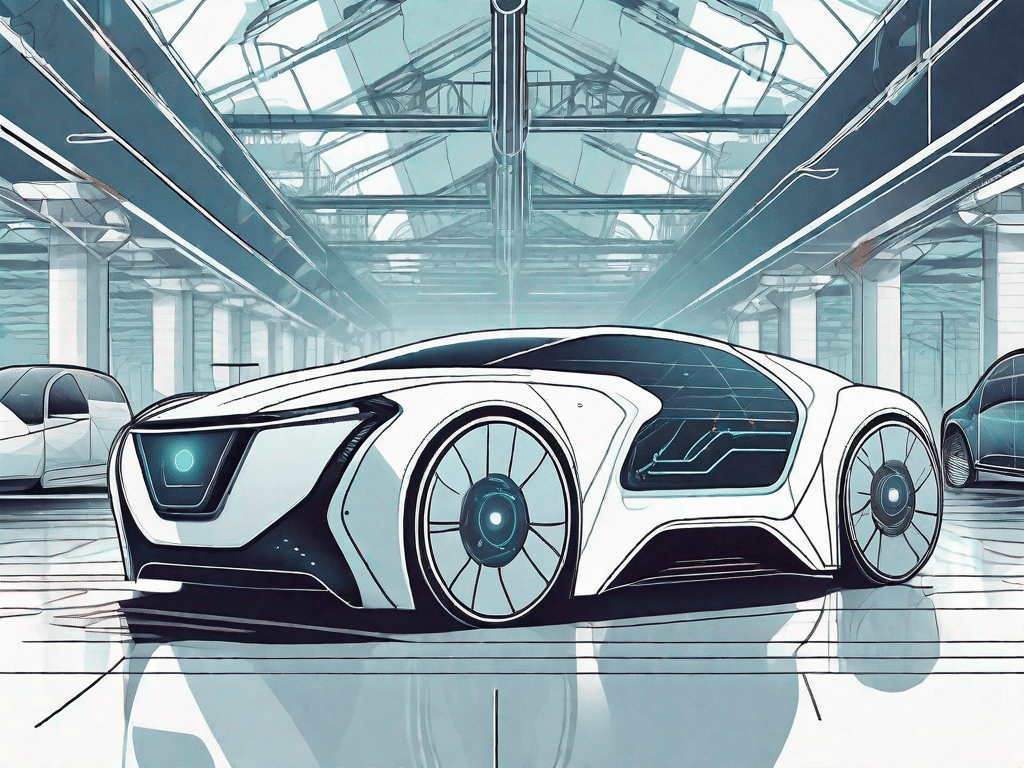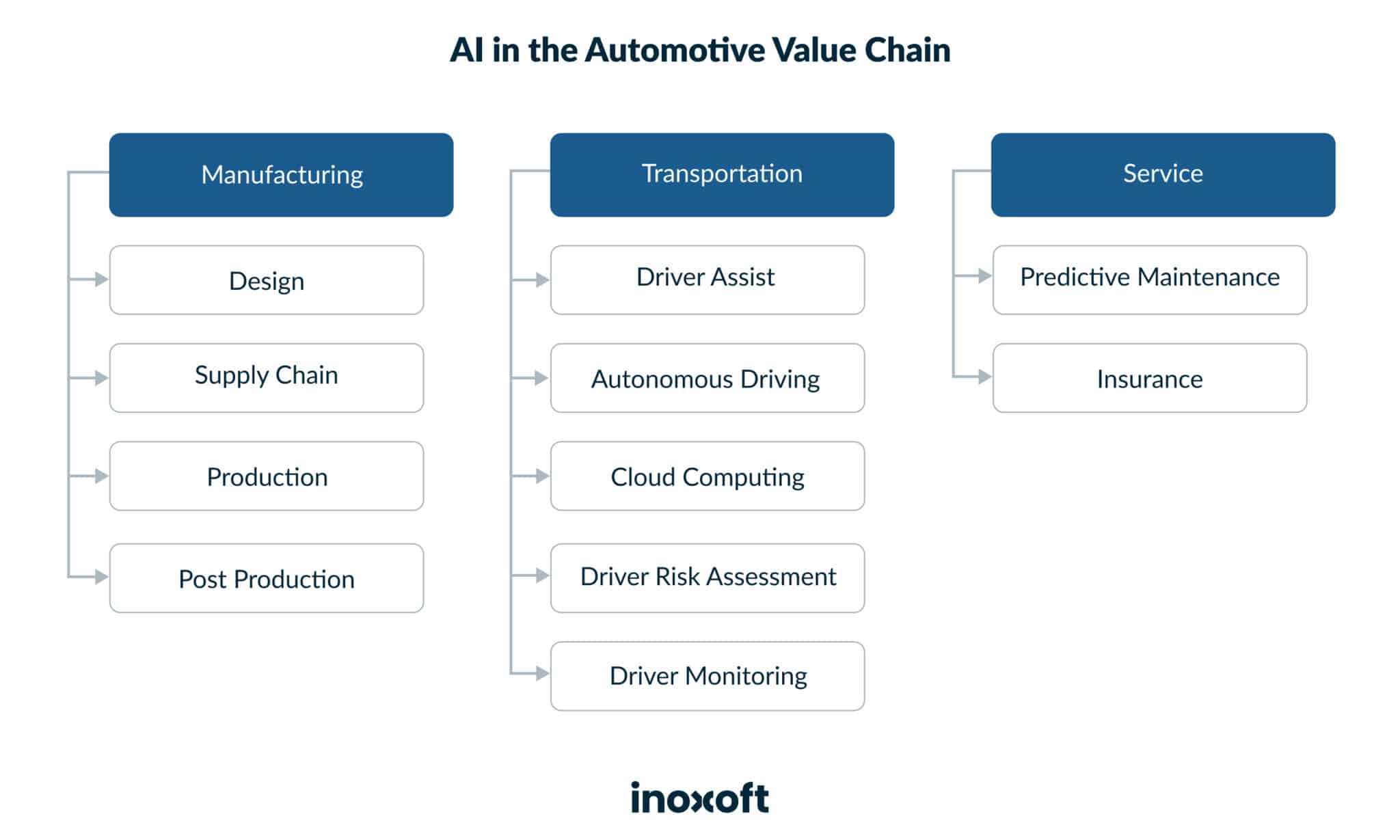The automotive industry has always been at the forefront of technological advancements. From the invention of the assembly line to the integration of automation, this industry has constantly embraced innovation. One of the latest and most impactful technologies making its way into the automotive sector is artificial intelligence (AI). In this article, we will delve into the various use cases of artificial intelligence in the automotive industry, highlighting its role, applications, and future potential.
- AI and Its Role in Automotive
- The Intersection of AI and Automotive Technology
- AI Applications in Vehicle Manufacturing
- Streamlining Production with AI
- Quality Control and AI Integration
- AI in Automotive Design and Development
- Development of Autonomous Vehicles
- AI in Vehicle Maintenance and Repair
- Predictive Maintenance Using AI
- AI in Diagnostics and Repairs
- AI in Automotive Sales and Marketing
- The Future of AI in the Automotive Industry
- Emerging AI Trends in Automotive
- Contact Us
Before we explore the specific use cases, let’s define what artificial intelligence is and how it relates to the automobile industry. Artificial intelligence refers to the development of computer systems capable of performing tasks that would normally require human intelligence. In the auto industry, AI can be the application of intelligent algorithms and machine learning models to various aspects of vehicle design, manufacturing, maintenance, and marketing.
In recent years, AI has been deployed for parking assistance, cruise control, and level 1 and 2 autonomous vehicles (see a table below) which has resulted in increased adoption of technology. Soon, AI technology is expected to be part of many automotive applications. It is be expected that by 2030, 95–98% of the new vehicles may have AI technology.
| 0 | NO AUTOMATION | Fully operated by human |
| 1 | DRIVER ASSISTANCE | The vehicle is controlled by a human with a driving assistance feature to help with steering and acceleration |
| 2 | PARTIAL AUTOMATION | Human control is reduced with automated system controls steering and acceleration at the same time |
| 3 | CONDITIONAL AUTOMATION | Human will respond and intervene whenever needed all other times vehicle is controlled by an automated system |
| 4 | HIGH AUTOMATION | In defined areas, the performance of the vehicle is fully controlled by an autonomous driving system |
| 5 | FULL AUTOMATION |
In all areas, the performance of the vehicle is fully controlled by an autonomous driving system |
source: Future Bridge
AI and Its Role in Automotive
Artificial intelligence plays a crucial role in the automotive industry as it enhances efficiency, improves safety, and enables the development of innovative features. It powers technologies such as autonomous driving, personalized marketing, and more. By harnessing the power of AI, automotive companies can revolutionize the way self driving vehicles are designed, manufactured, marketed, and maintained.
Autonomous driving is one of the most exciting applications of AI in the automotive industry. With autonomous cars, the need for human intervention is significantly reduced, leading to safer and more efficient transportation. Autonomous vehicle technology with autonomous driving systems uses a combination of sensors, cameras, and AI algorithms to navigate roads, detect obstacles, and make real-time decisions.
Predictive maintenance is another area where AI is making a significant impact. By analyzing data from various sensors and systems within a vehicle, AI programs can predict when maintenance is needed and alert drivers or service centers accordingly. This proactive approach helps prevent breakdowns and reduces the cost of repairs.
Personalized marketing is yet another area where one can observe AI transforming the automotive industry. By analyzing customer data and preferences, algorithms for AI can deliver targeted advertisements and offers to potential buyers. This personalized approach improves customer engagement and increases the likelihood of making a sale.
source: Future Bridge
The Intersection of AI and Automotive Technology
As technology continues to advance, the automotive industry is becoming increasingly reliant on AI-driven solutions. The integration of AI with automotive technology allows for intelligent and automated decision-making processes. From self-driving vehicles to advanced driver assistance vehicles, AI is transforming the automotive landscape.
Self-driving vehicles are at the forefront of AI and automotive technology integration. These vehicles use a combination of sensors, cameras, and special algorithms to perceive their surroundings, make decisions, and navigate roads. The goal is to create fully autonomous vehicles that can operate without any human intervention, leading to safer and more efficient transportation.
Advanced driver assistance systems (ADAS) are another example of artificial intelligence and automotive technology intersecting. Systems with driver assistance use algorithms that analyze data from various sensors and assist drivers in real-time. They offer features like adaptive cruise control and collision avoidance, providing a comprehensive driving assistance experience. Driver assistance systems continue to evolve, integrating cutting-edge AI programs to analyze real-time data and enhance safety on the roads. Automated technologies, such as automatic emergency braking and predictive steering, exemplify the ongoing progress in both driving and driver assistance. With features like self-parking and traffic jam assist, the synergy between AI and driver assistance systems creates a sophisticated driver assistance experience for users.
Artificial intelligence is also being used in the automotive industries to improve fuel efficiency. By analyzing data from sensors and systems within a vehicle, algorithms for AI can optimize engine performance, reduce aerodynamic drag, and minimize energy consumption. This not only saves fuel but also reduces emissions, making not only electric vehicles more environmentally friendly.
In conclusion, AI is revolutionizing the automotive industry by enhancing efficiency, improving safety, and enabling the development of innovative features. From autonomous driving to predictive maintenance and personalized marketing, AI is transforming the way vehicles are designed, manufactured, marketed, and maintained. As technology continues to advance, the integration of AI with automotive technology will only become more prevalent, leading to a future where AI-driven solutions are the norm in the automotive industry.
AI Applications in Vehicle Manufacturing
The manufacturing of vehicles involves complex processes that require precision and efficiency. AI is becoming an integral part of vehicle manufacturing, improving productivity and quality control.
AI technology has revolutionized the way vehicles are manufactured in the automotive market. With its ability to analyze large amounts of data and make informed decisions, AI has streamlined production processes and enhanced quality control in the automotive industry.
Streamlining Production with AI
AI technology enables manufacturers to optimize production lines, monitor real-time data, and automate repetitive tasks. By analyzing production patterns and data, AI programs can identify bottlenecks, reduce downtime, and eliminate inefficiencies. This not only improves productivity but also ensures that vehicles are manufactured in a timely manner, meeting the increasing demands of the automotive AI market.
One of the key benefits of AI technology in car manufacturing is its ability to predict and prevent equipment failures. By continuously monitoring the performance of machinery and analyzing data, algorithms for AI can detect early signs of malfunction, allowing car manufacturers to take proactive measures and avoid costly breakdowns. This predictive maintenance approach not only saves time and money but also ensures uninterrupted production.
Quality Control and AI Integration
Ensuring the highest quality standards in vehicle manufacturing is of utmost importance. Systems of quality assurance powered by AI utilize computer vision and machine learning algorithms to detect defects and anomalies in vehicles during the manufacturing processes. Utilizing computer vision and machine learning algorithms not only enhances the overall quality of vehicles but also reduces the chances of recalls and warranty claims.
Algorithms for AI are trained to identify even the smallest imperfections in vehicle components. They can detect variations in color, shape, and texture, ensuring that every vehicle meets the desired specifications. By automating the process of quality assurance, AI eliminates human error and provides consistent and reliable inspection results.
Furthermore, AI integration in quality control enables manufacturers to analyze data collected from various stages of the manufacturing processes. By correlating this data with customer feedback and market trends, manufacturers can gain valuable insights to further improve the design and production of vehicles.
In conclusion, AI has revolutionized car manufacturing by streamlining production processes, optimizing efficiency, and enhancing quality control. As technology continues to advance, AI technology will play an even more significant role in the automotive industry, autonomous driving innovation and shaping the future of automotive manufacturing.
AI in Automotive Design and Development
AI is revolutionizing the way vehicles are designed and developed. By leveraging AI technologies, automotive companies can create innovative designs, enhance vehicle safety features, and expedite the development process.
The integration of AI in automotive design and development has opened up a world of possibilities. With the power of programs for the AI, automobile companies can now analyze vast amounts of data and simulate various design options to optimize factors such as aerodynamics, safety, and aesthetics. This leads to the creation of vehicles that are not only visually appealing but also efficient, safe, and environmentally friendly.
Imagine a future where cars are not only sleek and stylish, but also designed to minimize drag and maximize fuel efficiency. Algorithms for AI can analyze wind tunnel data and simulate different design configurations to find the perfect balance between aesthetics and performance. This means that every curve, every contour, and every line on a vehicle’s exterior is carefully crafted to enhance its aerodynamic properties, resulting in reduced fuel consumption and lower emissions.
But AI-driven design innovations don’t stop at the exterior. The interior of a vehicle can also benefit from AI technologies. By analyzing user data and preferences, algorithms for AI can create personalized and intuitive user interfaces. Imagine a car that adjusts its seat position, climate control settings, and entertainment options based on the individual preferences of each passenger. With AI, the driving experience becomes not just comfortable, but tailored to the unique needs and preferences of each occupant.
Development of Autonomous Vehicles
Autonomous vehicles are one of the most exciting applications of AI in the automotive industry. By combining sensor data, machine learning, and advanced algorithms, automakers are developing self-driving cars capable of navigating roads, detecting obstacles, and making informed decisions.
The development of autonomous vehicles has the potential to revolutionize transportation as we know it. Imagine a world where commuting becomes a productive and enjoyable experience. With self-driving cars, people can reclaim the time spent behind the wheel and use it for work, relaxation, or leisure activities. Traffic congestion could be significantly reduced as autonomous vehicles communicate with each other to optimize routes and minimize delays. This not only improves efficiency but also reduces fuel consumption and emissions.
Furthermore, autonomous vehicles have the potential to make transportation safer. Human error is a leading cause of accidents on the road, but with AI-powered self-driving cars, the risk of human error is greatly reduced. These vehicles are equipped with advanced sensors that can detect sensor data and respond to potential hazards faster than any human driver. They can analyze real-time traffic data, weather conditions, and road infrastructure to make informed decisions and avoid accidents.
Moreover, autonomous vehicles have the potential to make transportation more accessible for all. For individuals with disabilities or limited mobility, self-driving cars can provide a newfound sense of independence and freedom. They can offer reliable and convenient transportation options, allowing individuals to travel to work, school, or social activities without relying on others.
In conclusion, AI is transforming the automotive industry by revolutionizing the design and development of vehicles. With AI-driven design innovations, automakers can create visually appealing, efficient, safe, and environmentally friendly vehicles. The development of autonomous vehicles powered by AI has the potential to make transportation safer, more efficient, and accessible for all. As AI continues to advance, we can expect even more exciting developments in the automotive industry in the years to come.
AI in Vehicle Maintenance and Repair
Maintaining and repairing vehicles can be a complex and time-consuming process. From routine maintenance tasks to diagnosing and fixing complex issues, the automotive industry is constantly seeking ways to improve efficiency and enhance overall vehicle performance. In recent years, AI technologies have emerged as powerful tools that are being leveraged to streamline maintenance and repair operations, revolutionizing the way vehicles are serviced.
Predictive Maintenance Using AI
Traditionally, maintenance and repairs were performed based on predetermined schedules or when issues surfaced. However, this approach often led to unnecessary maintenance, resulting in increased costs and downtime. With the advent of AI-powered predictive maintenance systems, a new era of proactive vehicle servicing has begun.
Algorithms for AI analyze real-time data from vehicles, including sensor readings, performance metrics, and historical data, to predict when maintenance is required. By identifying potential issues in advance, automakers can take preventive measures, reducing downtime, optimizing maintenance schedules, and enhancing the overall reliability and vehicle performance.
Imagine a scenario where a vehicle’s AI system detects a slight decrease in engine performance. Instead of waiting for a breakdown or relying on a fixed maintenance schedule, the AI system can analyze the data and predict that a specific part is likely to fail in the near future. This allows the automaker to proactively schedule maintenance, order the necessary parts, and minimize the impact on the vehicle’s operation.
AI in Diagnostics and Repairs
When a vehicle experiences a problem, accurately diagnosing the issue is crucial for efficient repairs. Traditionally, mechanics relied on their experience and manual inspections to identify the root cause of a problem. However, this approach can be time-consuming and prone to errors.
Algorithms for AI, on the other hand, can analyze vast amounts of vehicle data, identify patterns, and correlate them with known issues to provide accurate diagnostics. By leveraging machine learning techniques, these algorithms continuously improve their diagnostic capabilities, becoming more accurate over time.
Imagine a scenario where a vehicle’s check engine light comes on. Instead of relying solely on the mechanic’s expertise, an AI-powered diagnostic tool can analyze the vehicle’s data, including engine performance, sensor readings, and historical maintenance records, to pinpoint the exact cause of the issue. This not only saves time but also minimizes guesswork, ensuring that the repair process is efficient and effective.
AI can also assist mechanics during the repair process. By providing step-by-step instructions, visual aids, and real-time feedback, AI systems can guide mechanics through complex repairs, reducing the risk of errors and improving overall repair quality.
AI in Automotive Sales and Marketing
One of the significant advantages of artificial intelligence in cars in automotive sales and marketing is personalized marketing. By harnessing the power of AI algorithms, automakers can analyze vast amounts of customer data, including preferences, purchase history, and driver behavior patterns. This analysis enables them to create highly targeted marketing messages and offers that resonate with individual customers. Consequently, customers feel more connected to the brand, resulting in higher engagement, increased conversions, and ultimately, improved customer satisfaction.
Moreover, AI plays a crucial role in sales forecasting and inventory management, which are vital aspects of the automotive industry. Accurate sales forecasting allows automakers to predict future sales volumes based on historical data, market trends, and external factors. By leveraging AI algorithms, automakers can make data-driven decisions regarding production optimization and inventory management. This ensures that the right number of vehicles is manufactured, preventing overproduction or shortages, and maximizing profitability.
AI-powered inventory management systems employ different algorithms to continually monitor inventory levels, proactively triggering reordering when stock reaches predetermined thresholds. This proactive approach significantly reduces the risk of stockouts, ensuring that dealerships maintain a consistent and robust supply of vehicles to promptly meet customer demand. By seamlessly integrating AI into their supply chain strategies, automakers gain a formidable competitive edge, safeguarding against potential revenue losses due to insufficient inventory. This exemplifies how AI-driven solutions, coupled with supply chain optimization, play a pivotal role in strategically reshaping supply chain dynamics within the automotive industry.
The Future of AI in the Automotive Industry
The integration of AI in the automotive industry is just the beginning. As technology continues to evolve, we can expect to see even more exciting advancements in the AI automotive industry. Let’s explore some of the emerging trends and potential challenges.
Emerging AI Trends in Automotive
One of the emerging trends in the automotive industry is the development of AI-powered virtual assistants for vehicles. These assistants, powered by natural language processing and machine learning, can provide drivers with personalized recommendations, navigation assistance, and real-time information.
Imagine driving in your car and having a virtual assistant that knows your preferences and habits. It can suggest the best route to your destination based on real-time traffic data, weather conditions, and even your personal preferences. If you’re in the mood for some music, the virtual assistant can curate a playlist based on your favorite genres and artists.
Not only can AI-powered virtual assistants enhance the driving experience, but they can also contribute to improved safety on the roads. These assistants can detect driver fatigue or distraction and provide timely alerts or even take control of the vehicle if necessary. With AI, vehicles can become smarter and more intuitive, making our journeys safer and more enjoyable.
With AI car making process is also being leveraged to improve vehicle cybersecurity, enhance energy efficiency, and enable seamless connectivity. With the increasing complexity of modern vehicles, cybersecurity has become a paramount concern. Algorithms for AI can analyze vast amounts of data to detect and prevent potential cyber threats, ensuring the safety and integrity of the vehicle’s systems.
Energy efficiency is another area where AI can make a significant impact. By analyzing driving patterns, traffic conditions, and other relevant data, automotive industry artificial intelligence can help optimize energy consumption, leading to reduced emissions and improved fuel efficiency. This not only benefits the environment like in case with electric cars but also helps drivers save money on fuel costs.
Furthermore, AI enables seamless connectivity between vehicles and other devices. With the rise of the Internet of Things (IoT), cars can communicate with traffic lights, parking systems, and even other vehicles, creating a more efficient and interconnected transportation ecosystem. AI algorithms can process and analyze this vast amount of data in real-time, enabling vehicles to make informed decisions and adapt to changing road conditions.
Currently, automotive manufacturers lagging in the implementation of AI technology in their vehicles They have initiated collaborations with technology companies to develop autonomous vehicles. For instance, Mercedes-Benz is working with Bosch to develop level 4 and level 5 autonomous vehicles.
Here is an explanation of what these levels mean:
| 0 | NO AUTOMATION | Fully operated by human |
| 1 | DRIVER ASSISTANCE | The vehicle is controlled by a human with a driving assistance feature to help with steering and acceleration |
| 2 | PARTIAL AUTOMATION | Human control is reduced with automated system controls steering and acceleration at the same time |
| 3 | CONDITIONAL AUTOMATION | Human will respond and intervene whenever needed all other times vehicle is controlled by an automated system |
| 4 | HIGH AUTOMATION | In defined areas, the performance of the vehicle is fully controlled by an autonomous driving system |
| 5 | FULL AUTOMATION | In all areas, the performance of the vehicle is fully controlled by an autonomous driving system |
Contact Us
To learn more about how Inoxoft can help your automotive business harness the power of AI, contact us today. Our team of experts is ready to assist you in implementing AI solutions tailored to your specific needs.
Frequently Asked Questions
How can AI improve safety in vehicles?
AI enables the development of advanced driver assistance systems and autonomous vehicles, reducing the risk of human error and accidents. By analyzing sensor data and making real-time decisions, AI-powered systems can help prevent collisions, detect drowsiness, and improve overall road safety.
Can AI enhance the driving experienc
Yes, AI technologies can enhance the driving experience by providing personalized recommendations, optimizing comfort settings, and creating adaptive environments. Virtual assistants, powered by AI, can understand driver preferences and adjust various parameters, such as temperature, music, and lighting, to create a tailored driving experience.
How can AI impact sustainability in the automotive industry?
AI plays a crucial role in developing environmentally friendly vehicles. By optimizing design and manufacturing processes, AI reduces material waste and energy consumption. Additionally, AI can analyze vehicle performance data to identify areas for improvement, leading to more fuel-efficient and eco-friendly vehicles.









